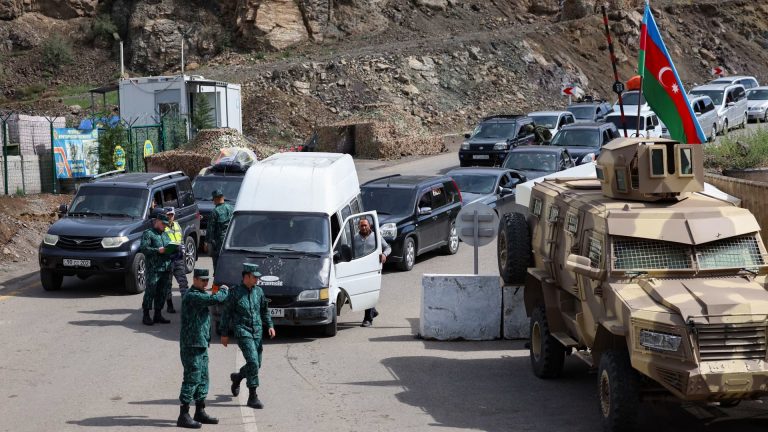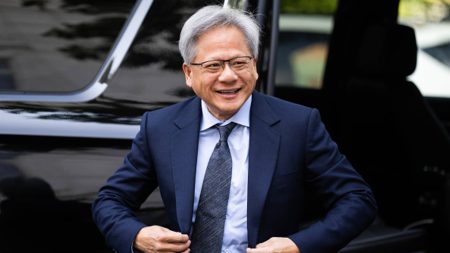With Russia’s invasion of Ukraine its most pressing geopolitical priority for at least the last 19 months, Moscow has not had much time or opportunity to hold as much power and influence over all its other neighbors — a position it has enjoyed since the breakup of the Soviet Union more than 30 years ago.
Russia’s influence in parts of the South Caucasus region — which includes Armenia, Azerbaijan and Georgia — and other former Soviet republics such as Belarus and those further afield, such as Kazakhstan and Kyrgyzstan, differs from state to state. It’s also largely dependent on the degree of pro-Western or pro-Russian sentiment among the people and leadership, as well as the level of economic and geopolitical reliance on Moscow.
But analysts say one thing is for certain: The war in Ukraine has created the irony that a distracted Russia has lost a degree of power, control and leverage over its own wider backyard.
Azerbaijan’s seizing of breakaway region Nagorno-Karabakh from Armenia in September highlighted Russia’s somewhat weakened or reshaped role in the region — given its perceived lack of anticipation of the offensive and lack of intervention in a long-running dispute in which it has traditionally been a mediator.
In a sign that Russia was caught off guard by the conflict in its own backyard, just one day before Azerbaijan launched its lightning offensive, Russia’s Foreign Ministry said in a statement that the humanitarian situation was improving in Nagorno-Karabakh and hoped that would aid the “normalising” of Armenian-Azerbaijani relations.
The Kremlin rejects accusations that it no longer has the leadership status it once enjoyed, with President Vladimir Putin’s Press Secretary Dmitry Peskov telling CNBC that “there is no such possibility” that Moscow’s influence has waned among its neighbors.
“Each area is equally important for Russia. Russia continues to play its role in the Caucasus,” Peskov said in emailed comments.
Russia seen in a new light
Geopolitical analysts are not so unequivocal, saying Russia’s failure to seize Ukraine in a matter of days — as Moscow expected — when its forces first invaded in February 2022, showed its military capabilities in a new light to its neighbors.
“The question arose about the real fighting capacity of the Russian army,” Vira Konstantinova, political scientist and international relations specialist, told CNBC.
Within the first month of fighting, and with Russian forces withdrawing from the outskirts of Kyiv, Ukraine’s armed forces had managed to debunk a “key myth of Russian propaganda,” she noted — that Russia’s army was powerful, well equipped and capable.
In fact, she said, Kyiv’s resistance highlighted to Russia’s neighbors and partners that “Russian power is a bubble with only a nuclear button in its center.”
Russian opposition politician Vladimir Milov, who once worked under Putin in the early days of his leadership, before becoming disillusioned with Russia’s geopolitical direction of travel, agreed that the war in Ukraine has, ironically, made Russia look weaker among its post-Soviet neighbors.
“If you take Ukraine out of the equation it’s really clear that Russia does not control the post-Soviet space, as Ukraine is bigger and more important than everything else. So it’s fair to say that if you do not control Ukraine, you do not control the post-Soviet space,” he told CNBC.
“When it was clear that Russia was failing to establish dominance over Ukraine, everybody else also saw that and started to behave more independently. People see that they [Russia] is not achieving this ultimate task and that means they are weak and have to turn elsewhere,” he noted.
Milov said there used to be two schools of thought in Russia two decades ago: one is that Moscow needed to reassert dominance over its post-Soviet neighbors and another — followed by Milov — believed Russia’s neighbors should be treated as equals and integrated, with Russia, into a broader Western space.
Milov said his school of thought had been erased over time — Putin, he said, “squeezed it out.”
Opportunity for the West
Geopolitical analysts say Russia’s influence may have been shaken, but has certainly not disappeared — it remains a superpower among its neighbors and the possibility of further Russian intervention in Russian-backed breakaway regions such as Transnistria in Moldova and Abkhazia and South Ossetia in Georgia has not been discounted.
Igor Semivolos, executive director of the Center for Middle East Studies in Ukraine, noted that while it could be said that the “intensity” of Russia’s interactions in what it sees as its backyard has declined — particularly as it “concentrates the main effort on the Ukrainian question” — it’s not entirely correct to say that “Russia has lost its grip.”
“In general, so far, the weakening is observed only in the context of the reduction of Russia’s foreign policy initiatives in this region,” he told CNBC in emailed comments, adding that Russia still “maneuvers and tries to distribute the resources to keep the situation under control.”
But if Western nations wanted to take the opportunity to break Russia’s increasingly precarious hold over its neighbors, foreign policy initiatives and security guarantees are needed now, he said.
“It’s important that other powers start entering the region. The USA and Turkey [could] offer the countries their own security formulas [guarantees], and perhaps in the future, these security formulas will become more attractive than the Russian one,” he said.
Analysts say the West should certainly be reaching out to such Eurasian countries while the opportunity presents itself, and Russia is distracted with Ukraine. Azerbaijan’s decision to strike Armenia while Russia’s back was turned, metaphorically, showed that Moscow’s hands are largely tied, they note.
“Russia’s war on Ukraine has shaken stability in the South Caucasus, and Moscow may try to claw back influence in the region at the expense of regional peace and security,” Vasif Huseynov, head of the Western Studies department at the Center of Analysis of International Relations, a think tank based in Azerbaijan, noted in analysis.
But greater U.S. engagement with the likes of Azerbaijan could “reinforce a platform for peace between Azerbaijan and Armenia” and could help “counter threats to shared interests” from Moscow and Tehran, he noted.
Read the full article here









